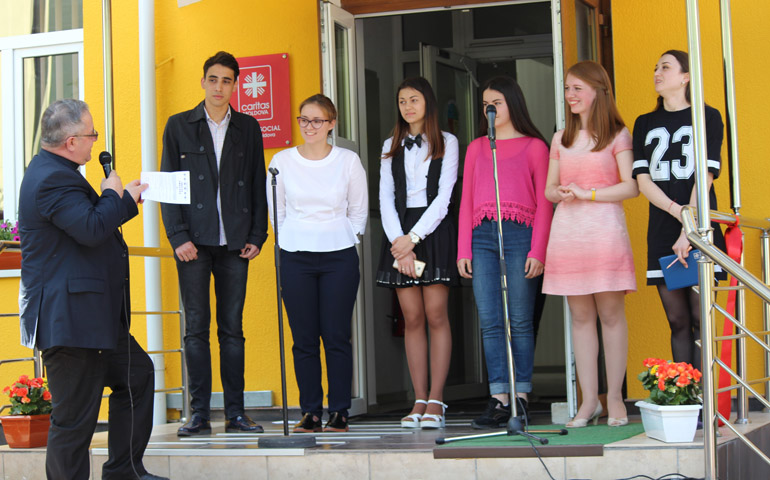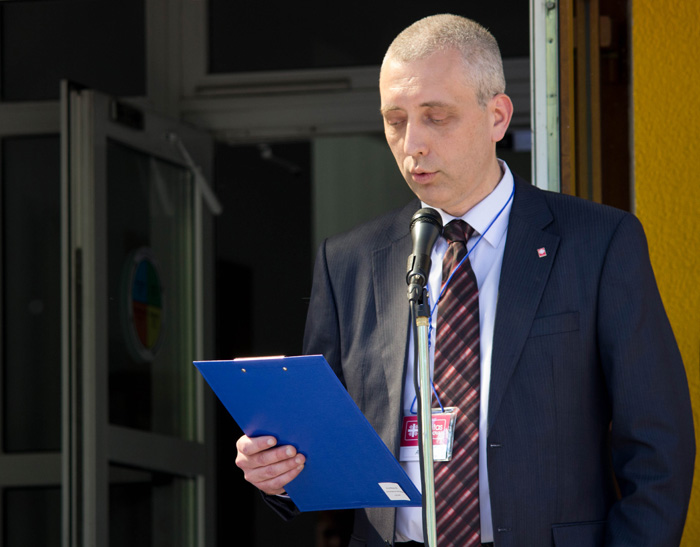
Volunteers answer questions at the official opening of Caritas Moldova's new social center in the capital city of Chisinau, Moldova. (Andrei Bolocan)
"I believe in God, but I do not support organized religion. I'm spiritual though." We have all heard these words or some variation thereon. They represent an old, Voltairian suspicion but they are inadequate. While we have all met some wonderful and generous people who say things like this, the fact is that only organization can achieve some of the kinds of work our Catholic Church accomplishes day in and day out.
On Ash Wednesday in most dioceses in the U.S., the second collection goes to aid the church in Central and Eastern Europe. The timing is not coincidental: In Lent, we deprive ourselves as part of our spiritual development, but in these countries that experienced communist rule for decades, the deprivation is not part of a spiritual effort, but a residue of past injustices from communism and current injustices from capitalism.
Recently, the U.S. bishops' conference announced the awarding of $4.8 million in grants for 206 different projects in 22 countries in Central and Eastern Europe, all of it drawn from that special collection. Catholic Relief Services is also heavily involved in the region.
Moldova is the poorest country in Europe in per capita terms. According to World Bank data the per capita income in 2016 was $2,120. The 3.6 million people inhabit a strip of land sandwiched between Ukraine and Romania, and its political history has been tortured by its geography. Even now, the two main political parties divide over whether they wish to align with Russia or with Europe.
Catholics represent only a sliver of the population, less than one percent, but because of the assistance they receive from the bishops' conference, Catholic Relief Services, and Caritas, the international Catholic relief agency, they are able to punch above their weight, helping not only their 20,000 co-religionists, but Moldovans of any religion.
"Our language is derived from Latin, and historically we have nice Catholic traditions although the biggest part of population is Orthodox," says Andrei Bolocan, director of Caritas Moldova. "We don't have any conflicts between Orthodox and Catholics throughout history. Orthodox Moldovans maintain the atmosphere of tolerance towards Catholics. We help those who need it. We don't ask a person what religion he to which he belongs. And Moldovans know that Catholics help everybody."
Earlier this year, in May, Caritas Moldova opened a new social center in the capital city of Chisinau. The center aims to help "poor and lonely people, people who have been left behind by society," Bolocan explains. "Some of them need food and we give them a food package. Others need clothes and we give them clothes collected in fundraising campaign. A third group needs shelter and we direct them to our Center for Homeless People in the suburb of Chisinau. Every homeless person is given a medical examination (skin diseases, lice, tuberculosis, HIV/AIDS) on entry to the center. Each person shall be given a warm meal, hot shower and clean clothes. Our social assistant works with every incoming person for his social rehabilitation. And sometimes, people walk in and tell us about their lonely neighbor who is bedridden and forgotten. And our medical assistant goes to this person and helps him." The new center has a staff of twenty.
At the opening of the center, some of the younger volunteers engaged in "social theater," performing a short play about the abandoned elderly. The amateur actors wrestled with the questions they hear from the many older people in Moldova whose children have left in search of a better life: "What is the meaning of life? Why has God given me a life? What did I do wrong that I'm alone at the end of my earthly life?" I can't imagine such "social theater" even happening in an American context, but that may only be the measure in which we have ceded our imaginations to Hollywood.

Andrei Bolocan, director of Caritas Moldova, speaks during the opening of the new social center. (Andrei Bolocan)
Bolocan is exceedingly grateful for the assistance that the church in Moldova receives. "All our eyes are to the West because we see a nice example of good functioning institutions of democracy," he says. "Catholic Relief Services has assisted us in buying the new social center. We have a project with the USCCB — 'Strengthening Local Parish Life and Citizen Participation with Community Organizing Strategies in Moldova.' The primary purposes of this project are to use community organizing strategies to build active citizen participation rooted in a number of the Catholic parishes and to strengthen parish life."
I met Bocolan at another USCCB-funded event, a two-week intensive English program for bishops, seminary rectors, directors of local Caritas centers and other church leaders. As part of the two-week course, I helped organize a two-day seminar in Catholic social thought last year, and Bocolan was one of the participants. Next month, I will again travel to Poland to lead the second such seminar for a new group of church leaders.
Advertisement
"Moldova has been a priority country for us for quite some time," says Tetiana Stawnychy, director of the bishop conference's subcommittee for the Church in Central and Eastern Europe. "To quote my predecessor, Declan Murphy, Moldova is one of the poorest and most politically unstable countries we serve, the Catholic population there while small is vibrant, and the diocese always has excellent construction projects and innovative pastoral outreach efforts." Those contributions on Ash Wednesday in the churches of the United States, those donations to
Bocolan was named director of Caritas Moldova in May 2016 by Bishop Anton Cosa of the diocese of Chisinau. "Before my appointment here, after graduation, I worked more than 10 years as a doctor in a prison," he tells me. "Then I worked for eight years at the Austrian charitable organization Concordia, founded by Fr. Georg Sporschill, S.J. I arranged soup kitchens for socially vulnerable groups. Also, I opened some dentists' offices in the countryside for socially excluded groups. … God constantly forwards me to people who need help and all my entire adult life I try to make life easier for these persons."
Meeting people like Bocolan is humbling and thrilling. Humbling because of the obscene creature comforts we Americans take for granted, and thrilling to see the Gospel alive and in action.
[Michael Sean Winters covers the nexus of religion and politics for NCR.]
Editor's note: Don't miss out on Michael Sean Winters' latest! Sign up to receive free newsletters, and we will notify you when he publishes new Distinctly Catholic columns.








